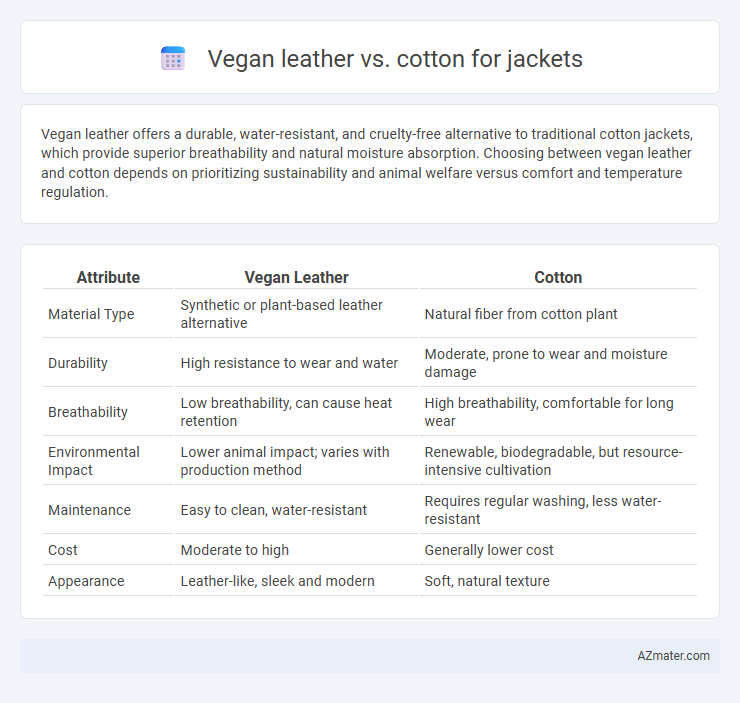Vegan leather offers a durable, water-resistant, and cruelty-free alternative to traditional cotton jackets, which provide superior breathability and natural moisture absorption. Choosing between vegan leather and cotton depends on prioritizing sustainability and animal welfare versus comfort and temperature regulation.
Table of Comparison
| Attribute | Vegan Leather | Cotton |
|---|---|---|
| Material Type | Synthetic or plant-based leather alternative | Natural fiber from cotton plant |
| Durability | High resistance to wear and water | Moderate, prone to wear and moisture damage |
| Breathability | Low breathability, can cause heat retention | High breathability, comfortable for long wear |
| Environmental Impact | Lower animal impact; varies with production method | Renewable, biodegradable, but resource-intensive cultivation |
| Maintenance | Easy to clean, water-resistant | Requires regular washing, less water-resistant |
| Cost | Moderate to high | Generally lower cost |
| Appearance | Leather-like, sleek and modern | Soft, natural texture |
Introduction: Vegan Leather vs Cotton Jackets
Vegan leather jackets offer a cruelty-free, water-resistant alternative to traditional leather, attracting eco-conscious consumers seeking animal-friendly fashion. Cotton jackets provide natural breathability and softness, making them ideal for comfort and versatility in various weather conditions. Choosing between vegan leather and cotton depends on preferences for sustainability, durability, and style.
Material Composition and Sourcing
Vegan leather for jackets is typically made from polyurethane (PU) or polyvinyl chloride (PVC), often sourced from synthetic materials designed to mimic animal leather while reducing animal cruelty. Cotton jackets rely on natural fibers derived from the cotton plant, which can be organic or conventionally farmed, impacting environmental sustainability and chemical usage. The choice between vegan leather and cotton hinges on material durability, breathability, and the environmental footprint of sourcing processes, with vegan leather offering water resistance and cotton providing comfort and biodegradability.
Environmental Impact Comparison
Vegan leather, often made from polyurethane or plant-based materials like pineapple leaves, generally has a lower water footprint and requires fewer pesticides than conventional cotton, reducing environmental strain. Cotton cultivation demands significant water resources and involves heavy pesticide use, contributing to soil degradation and water pollution. However, the synthetic nature of many vegan leathers raises concerns about microplastic pollution and long-term biodegradability.
Durability and Longevity
Vegan leather offers superior durability compared to cotton, as it resists wear and tear, water damage, and stains more effectively, making it ideal for long-lasting jackets. Cotton jackets, while breathable and comfortable, tend to fade, shrink, and degrade faster with frequent washing and exposure to environmental elements. Investing in vegan leather jackets ensures extended usage and maintains aesthetic appeal, especially in demanding conditions.
Comfort and Breathability
Vegan leather jackets offer a sleek appearance but tend to have lower breathability compared to cotton, which allows better air circulation and enhanced comfort during extended wear. Cotton jackets naturally absorb moisture and provide superior softness, making them ideal for maintaining comfort in warm or humid conditions. While vegan leather is water-resistant and durable, it may cause overheating and reduced ventilation, impacting overall comfort.
Style Versatility and Appearance
Vegan leather offers a sleek, modern aesthetic with a glossy or matte finish that mimics genuine leather, making jackets look edgy and stylish for urban or casual wear. Cotton jackets provide a softer, more breathable texture with a matte appearance, ideal for versatile layering and a relaxed, timeless look. Both materials offer distinct style versatility: vegan leather suits bold, statement pieces while cotton excels in everyday comfort and adaptability across seasons.
Maintenance and Care
Vegan leather jackets require minimal maintenance, needing only occasional wiping with a damp cloth to remove dirt and prevent cracking, while avoiding prolonged exposure to direct sunlight. Cotton jackets demand more frequent washing to maintain freshness, with careful attention to washing instructions to prevent shrinkage and fabric damage. Both materials benefit from proper storage in a cool, dry place to extend garment lifespan.
Cost and Affordability
Vegan leather jackets typically cost more upfront than cotton jackets due to synthetic material manufacturing and durability factors. Cotton jackets are generally more affordable and widely available, making them a budget-friendly choice for casual wear. Long-term expenses for vegan leather may be lower as it resists wear and stains better than cotton, which often requires more frequent replacement or cleaning.
Ethical Considerations
Vegan leather, often made from polyurethane or plant-based materials, offers an animal-friendly alternative that reduces harm to wildlife and lowers ethical concerns related to animal cruelty. Cotton jackets, while natural and biodegradable, may involve significant water usage and pesticide application, raising environmental and labor rights issues in some farming regions. Ethical considerations prioritize sustainable sourcing, cruelty-free production, and minimizing ecological footprints for both materials in jacket manufacturing.
Final Verdict: Which Jacket Material Wins?
Vegan leather offers durability, water resistance, and a stylish, cruelty-free appeal, making it ideal for fashion-forward jackets. Cotton jackets provide breathability, natural comfort, and better moisture absorption, suitable for casual, everyday wear. The final verdict depends on usage context: choose vegan leather for sleek, weather-resistant outerwear and cotton for lightweight, breathable jackets.

Infographic: Vegan leather vs Cotton for Jacket
 azmater.com
azmater.com